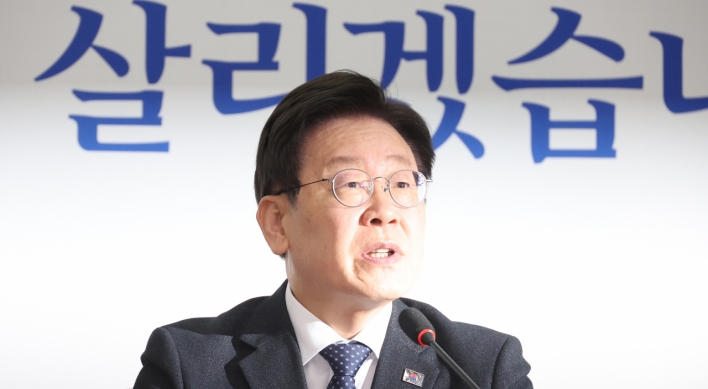Gil Won-ok was 13 when she arrived at a comfort station for Japanese soldiers in northeast China. She was forced to have sex with more than 20 soldiers a day, until the war ended three years later in 1945.
After she had developed tumors relating to syphilis, a sexually transmitted disease, a Japanese military doctor removed her uterus.
Gil, now 82, is one of an estimated 200,000 women - euphemistically called "comfort women" - who were forced to be sex slaves for Japanese soldiers during the war.
Historians say the Japanese military was involved in coercing and deceiving young women into sexual slavery throughout Japan`s Asian colonies and occupied territories. And many of them were taken from Korea, which was under Japanese colonial rule from 1910-1945.
With the 1990 establishment of the Korean Council for Women Drafted for Military Sexual Slavery by Japan, the issue of Japan`s war-era sex slaves started gaining public attention, both in Korea and internationally.
language="JavaScript"src="/khjs/banner/article_340.js">
Testimonies were given by some women who had born this horrific burden for their entire life. Now, of the 234 Korean women who have publicly revealed their war-time suffering, only 91 are still alive.
In order to urge the Japanese government to officially apologize, the surviving women and rights activists have held demonstrations in front of the Japanese Embassy building in central Seoul every Wednesday since 1992. However, no Japanese official from the embassy has ever greeted the protesters.
Despite historic documentation and testimonials, the Japanese government has not yet acknowledged its responsibility for the brutal mistreatment of the women. In 1995, Japan set up an "Asia Women`s Fund" to compensate the victims. Because it was funded through private donations and did not involve any government funding, many refused to accept any money because they did not see the measure as a sincere apology and atonement for its brutal crimes.
As other survivors have died of old age and complications from the sexual abuse, Gil has become a representative figure for the movement.
"They (the Japanese) may think the issue will be buried in history after the 91 remaining grandmothers die. But historic facts are beyond their control," Gil said on Monday, before leaving for Sydney to participate in a global solidarity demonstration and other lobbying activities.
Marking the 64th anniversary of the nation`s Liberation Day on Saturday, a simultaneous international protest will be staged in the United States, Japan, Taiwan, Germany and Australia, as well as in Korea.
"Another war could break out at any time and this thing (sexual slavery) could happen again, even in a now-peaceful, stabilized country. Because the victims were Koreans, the issue should not be recognized as only the problem of Koreans," Gil said.
Thanks to her and other activists` years of efforts, in 2007 the U.S. House of Representatives passed the House Resolution 121, also known as HR 121, which was spearheaded by Rep. Mike Honda.
The nonbinding resolution called for Japan to "formally acknowledge, apologize and accept historical responsibility in a clear and unequivocal manner for its Imperial Armed Forces` coercion of young women into sexual slavery."
Resolutions of the Dutch parliament and Canada`s Parliament were followed in that year. Pressed by Amnesty International, the European Parliament also passed a resolution demanding Tokyo`s official apology and compensations for victims.
Despite the meaningful achievements, Gil expressed disappointment that no changes have been made so far after two years of those resolutions. Despite the international urging, Tokyo has never changed its firm stance, saying the U.S. resolution was "not based on objective facts."
And what makes her angrier is the Korean government`s neglect of the issue, she said.
"When I attend an overseas meeting, the most difficult question to respond is, `What does the Korean government do to deal with the issue?` I just say, `The Japanese are too stubborn to listen to us,`" she said, criticizing the government`s lukewarm attitude.
The non-profit group for comfort women is planning to build the so-called "Museum of War and Women`s Rights" in a bid to make more people better informed about the issue and prevent its recurrence in the future. But with a lack of financial support, the project has seen little progress.
"Whenever we launch our weekly protest, we (surviving comfort women) feel ashamed. But the government should understand the shame as its own. I hope the government recognizes the fact so that grandmothers don`t suffer from their scar any more." (jylee@heraldcorp.com)
By Lee Ji-yoon
- South Korea to launch space security center under spy agency
- Korea’s top finance firms put aside W1.7tr for Hong Kong-tied ELS compensation
- First-ever meeting of president, opposition chief set to finally happen
- [Today’s K-pop] NewJeans' single teasers release amid intrigue
- Med professors at major hospitals to take weekly day off
- Seoul shares rise 1% on tech, financial gains despite overnight US losses
- Jeju Air opts out of Asiana Airlines' cargo division bid
- Hybe-Ador feud should have limited effect on Hybe's overall performance: analysts
- Legoland Korea Resort to open until 9 p.m.
- Posco Future M, Honda to launch battery materials venture in Canada




![[Herald Interview] 'Amid aging population, Korea to invite more young professionals from overseas'](http://res.heraldm.com/phpwas/restmb_idxmake.php?idx=644&simg=/content/image/2024/04/24/20240424050844_0.jpg&u=20240424200058)







![[Hello India] Hyundai Motor vows to boost 'clean mobility' in India](http://res.heraldm.com/phpwas/restmb_idxmake.php?idx=644&simg=/content/image/2024/04/25/20240425050672_0.jpg&u=)





![[Today’s K-pop] NewJeans' single teasers release amid intrigue](http://res.heraldm.com/phpwas/restmb_idxmake.php?idx=642&simg=/content/image/2024/04/26/20240426050575_0.jpg&u=)